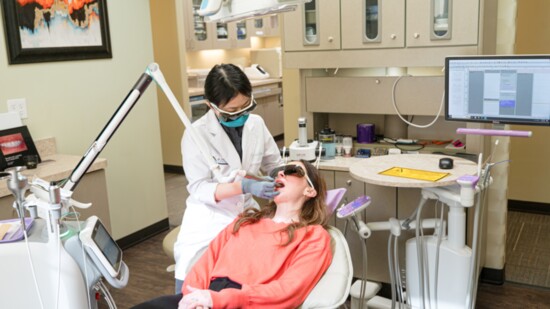When you can’t sleep well, it affects your waking life, too. Sleep disorders like snoring and sleep apnea can have serious detrimental effects on your health and the health of your partner and family. With an estimated 30% of adults in the US suffering, that’s a lot of people who aren’t living as well as they’d like. But local dentists Kurt Mackie, D.D.S. and Grace Zhang, D.M.D., Ph.D., say a new treatment they offer shows so much promise.
As we age, the tissues that comprise our soft palate and nasal passages become more flaccid, and this can be especially true when our bodies relax while sleeping. When these loose and enlarged tissues start to block our airways, the vibrations of these tissues cause the sounds we know as snoring, which can be disruptive enough by itself. But add in restrictions on air volume and airflow, and now the decreased oxygen intake and sleep disruption cause sleep apnea, which can have severe problems and can even be life-threatening.
The scores of treatment options for snoring and sleep apnea on the market cover the gamut regarding approach and effectiveness. Exercises, pillows, appliances, machines, and surgery are all offered as solutions, but Mackie says one in particular can potentially correct the problem, not just alleviate symptoms.
NightLase® by Fontana is a laser-powered, non-surgical system designed to tighten connective tissue, muscles, and other structures to open the soft palate and nasal passages. This results in an improvement in airflow and air volume while sleeping—and also during athletic or everyday activities. “100% of my patients notice an increase in air volume through their nose on the first session,” says Mackie. “This leads to less snoring immediately, and each subsequent treatment has a cumulative effect, improving significantly through the third session.”
What makes this treatment different? Mackie says the non-ablative approach uses laser light to tighten the connective tissue, muscle attachments, and fascia to shrink tissues, allowing airways to open more fully. Conversely, Mackie says many surgical treatments are destructive to the soft palate and can lead to long-term oropharyngeal problems. Mackie states, “By opening the airway with NightLase®, my use of anterior repositioning appliances and CPAP is much less aggressive and has fewer side effects.”
A NightLase® treatment plan typically includes the initial treatment and three to four repeated procedures about 21 days apart. Each session takes about 45 minutes, and there’s no anesthetic needed or recovery time required. After the treatment, touch-up maintenance is typically only required every year or two. However, Mackie says the results are long-lasting.
“I have had CPAP users notice that their machines record less airway resistance and drop the operating pressures,” he says. “One CPAP user for 10 years said he has never had such deep sleep for six to eight hours.” The FDA currently approves the laser system as safe and effective for the tissues being treated, but the FDA has not yet signed off on the use of NightLase® to replace the use of CPAP machines. However, Mackie says that the process is in the works.
He says these results are encouraging, especially considering the long-term potential for treatments like NightLase®. “Current research is questioning lung cell damage by long-term positive pressures,” Mackie says. He says some studies show “the same damage from long-term CPAP use to lung tissues as we saw with ventilator use during the COVID pandemic.” And while CPAP is still considered safe and effective, Mackie says the future is bright thanks to NightLase®. “I feel that in the near future, we will be able to manage a high percentage of sleep apnea patients without the use of CPAP or anterior repositioning appliances.”
mackiedental.com | 830-331-5456 | 1677 River Rd., Ste. #103
